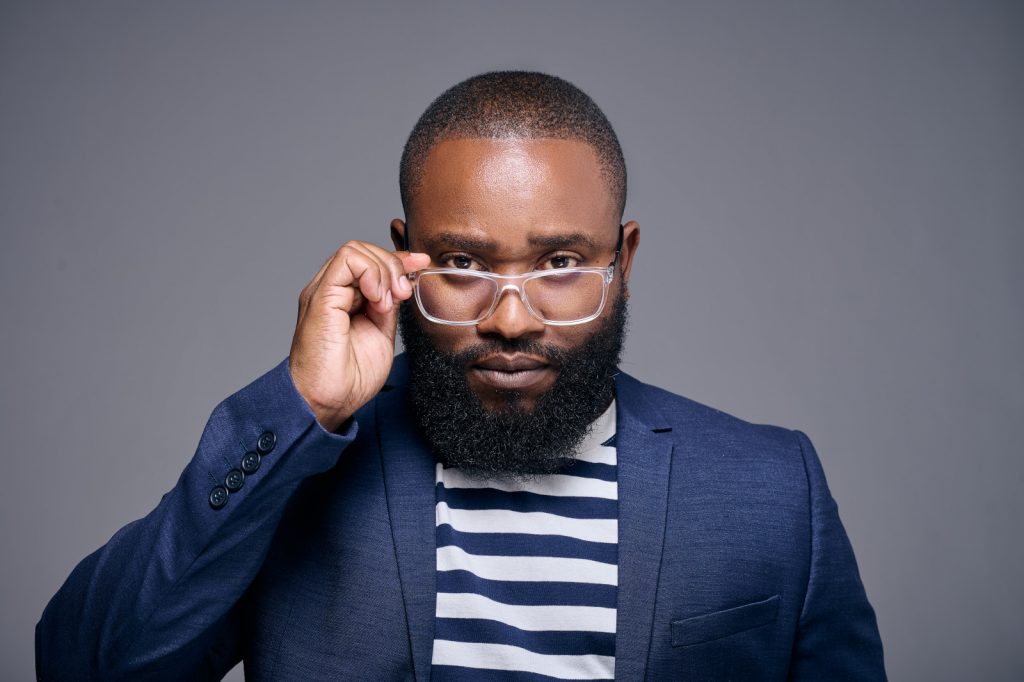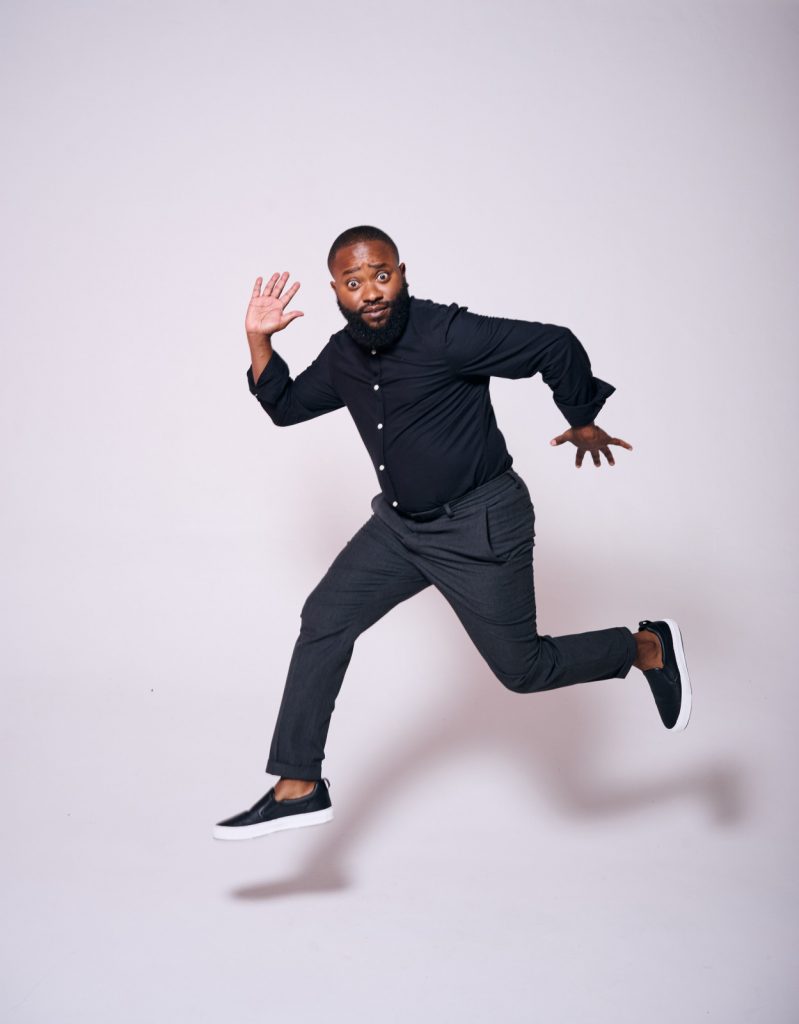Jokes aside: Eugene Khoza is back on the comedy stage after taking a five-year hiatus to recover from grief and to rediscover himself.
Photo: Natalie Payne/Gallo Images/Drum
“The thing with grief, you know, it doesn’t knock or send a meeting request. One minute you are having fun and the next it hits you like a ton of bricks.
“I had no escape from dealing with it, except comedy, and that escape started becoming a nonentity or a way not to escape because I had to tell the truth and I started feeling like a fraud,” explains comedian Eugene Khoza, about his five-year break from public life.
“The fortunate and unfortunate part about my job is that it involves being happy and I couldn’t be happy on stage when I personally wasn’t.”
Comedy in South Africa can’t be spoken of without mentioning Khoza, who has returned to the stage with more honesty, self-awareness and having grown, not only professionally, but also in his personal life.
After the death of his son five years ago, and his best friend Moyikwa Sisulu last year, the comedian found himself slipping into a dark, isolated space as he battled with the grief that comes with loss.
“I took for granted how grief was going to sneak up on me,” Khoza says, as he details his journey to healing. He also had to deal with the guilt of moving on, which made him feel hopeless, as if there was “no light at the end of the tunnel”.
“The biggest thing about losing people who you love is the guilt of having fun without the person that you care about.
“People lose their children, their parents and family all the time, but most of us never have the luxury to sit and deal with it. We just bury it and we have to keep going.”
Pretoria-born Khoza’s career was kickstarted when he won the Ricoffy Comedy Challenge in 2007 and made it into the semifinals of the M-Net’s Laugh Out Loud comedy competition. He went on to establish a formidable reputation.
He crafted a career not only as a comedian, but a television personality, who was able to bring his gift of giggles to screens all over the country. We became accustomed to seeing him in the Nedbank adverts, co-hosting the reality series The AXE Sweet Life in 2009, alongside fellow comedian Trevor Noah, and on SABC1 sports magazine show Countdown 2010 from 2008 till 2010.

Khoza shares that the five years he spent away from the public eye and from performing allowed him the opportunity to face his mental challenges. This entailed struggling with who he was as a person and his public persona.
“I’m glad I took the time to heal and to confront my demons. And I wish that for so many people.
“Speaking as a black man, we usually don’t have the luxury to face whatever is bothering us. There is so much going on in the world right now, and if you look at the suicide rate for black men, particularly in South Africa, its alarming.”
The comedian says it was his 14-year-old daughter who taught him, through her own honesty, the importance of vulnerability and expressing his emotions, something he shares isn’t common within black male spaces.
“That’s a pandemic on its own. Those men are people’s fathers, boyfriends, sons — policemen and the local butcher. If those people are not feeling worthy, they go home and take it out on the easiest target, which is women and children.
“So, I’m very passionate about mental health.
“My friends and I always share books and podcasts and have conversations about the struggles of being black men in society,” he says.
Khoza says his wish is for there to be more initiatives to help young men and boys be open about their feelings and have safe spaces to share their struggles. He believes the ongoing scourge of abuse in the country stems from what boys are exposed to about women from a young age.
“If you are in the public eye, you are sheltered from a lot of things that the average black man goes through, like working in jobs that are demeaning and take away the dignity of people of colour.
“We end up in our communities feeling very low because we end up spending most of our time in places where our worth is not recognised, or seen in our own country and society, building up a lot of anger and resentment. I always say to people it doesn’t start when a boy is 14, it starts when he is four and they see what is going on — also through the kind of television people expose them to,” he says.
He believes these issues facing young black men could be addressed through performance and comedy.
Khoza, who started doing comedy shows again about three months ago, said he gained the confidence and desire to step back into performing through a radio interview.
Khoza shares that before he took time away from comedy to deal with his personal challenges, he had started finding performing mundane, more of a duty than a passion.
“The weird thing now is not worrying about what happens or who is there, but just wanting to share a message and having a good time. I’m just exploring now,” he says.
He recently put on a one-man show at The Gold Reef City Lyric Theatre, Johannesburg, titled Step Aside. Put together in four weeks, with no sponsor, and marketed mostly through social media, Step Aside was inspired by state capture. Khosa also performed it at the New York City Comedy Club.
“I had done so much work on myself, read so many books, ran so many kilometres, spent as much time as possible with my daughter and with my thoughts.
“Writing came up with so many ideas and none of them were comedy but being on stage was a cathartic moment; it just felt like this is where I belong,” says Khoza.

He has made an impact with some of the country’s biggest names in comedy including Noah and Celeste Ntuli. Ntuli, who has become a force in South African comedy, shares that Khoza had motivated her to pursue comedy professionally.
“His words encouraged me to take comedy as a full-time career. It was a long time ago — we had done a comedy show together — and I told him I’m going back to work after the show and he asked me why I’m still going back to work.
“So, he gave me the courage to take on comedy full time even though I had been thinking about it before,” says Ntuli.
The Money & Men comedian says she’s excited to see Khoza make a return as he’s one of the biggest and most inspiring names in South African comedy.
When speaking about what the future holds,Khoza says he is in a show set to premiere on prime-time television next year, a podcast that’ll be available on streaming platforms, is taking Step Aside on a national tour and plans to make a documentary about his journey in comedy.
He says the South African comedy industry would improve if local comedians “let go of their egos” and won back the trust of local audiences. He says, “without pointing fingers performers must respect audiences” by making sure they arrive on time for shows.
“I feel that the low self-esteem that we carry as comedians will be the end of us because we are not sounding like ourselves, we sound like everyone else.
“Apart from the United Kingdom, Australia or the United States, our continent and country can stand shoulder to shoulder with acts from all around the world,” says Khoza.